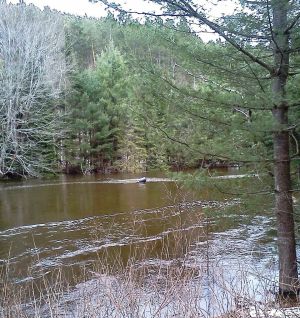Dealing With Flood Debris
By Rebecca Willison
It’s been over a month since Muskoka experienced a 100-year flood event, and recovery efforts continue today. The rushing waters swept away the chairs, docks, containers, canoes and woody debris left in the waterfront area of many homes and cottages, only to deposit them downstream.

Debris, like this garbage can floating down the Muskoka River during the flood in April, may eventually end up on your property. If this happens, it is your responsibility to dispose of it correctly.
So what do you do with the debris that has washed up on your property? Who should you call to have it removed? The simple answer is: no one. Garbage and debris that washes up on your property is your responsibility to dispose of properly, not the Ministry of Natural Resources’ and not the municipality’s. To make this easier, often a municipality will waive the tipping fee at the landfill for a limited time. Check with your local municipality to see if this is available to you.
Any waste related inquiries, including flood-related and debris wash-up questions, should be directed to the District of Muskoka Public Works Department at (705) 645-6764 or [email protected]. Disposal locations can be found on the District of Muskoka website at www.muskoka.on.ca or in your Waste Management Guide.
Not all debris is bad
Not everything that washes up on your property needs to be removed. Natural debris, such as logs, branches and rocks, may actually improve the wildlife habitat on your shoreline and can be left in place unless it causes a safety hazard.
Woody debris on your property can help protect your shoreline from erosion. Turtles use logs to bask and fish use underwater branches and logs to hide from predators and lay eggs. On land, logs provide essential habitat for small mammals, certain woodpeckers, toads and salamanders, many of which are species at risk.
Prevent future issues
Take a few minutes to look around your property and note where items are stored, both during the summer and the winter, as well as the likelihood that they will be damaged or swept away in a future flood. Chemicals typically kept near the shoreline, such as gas and oil, are especially damaging when they get into the water and should be kept in a secure location well above the high water mark. Use the recent flooding as a guide for where you should and shouldn’t keep possessions on your property.
Having a healthy shoreline with lots of native trees, shrubs and vegetation will help reduce erosion on your property during a flood event. Take a look around at properties affected by the recent flooding and you will notice that properties with a natural shoreline received far less damage than those with the vegetation removed and replaced with turf grass. Possessions on your property are also more likely to stay put.
With an expected increase in precipitation and storm events due to climate change, it likely won’t take 100 years to experience another 100-year flood event in Muskoka. It’s in our best interest to be prepared for whatever Mother Nature throws at us in the coming years.
Past articles are available in this blog under the Watershed Notes Articles category or under Past Articles in the Resources section.
